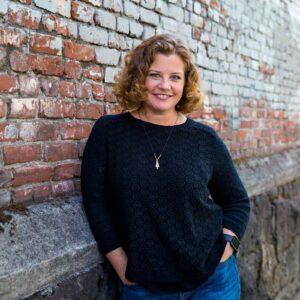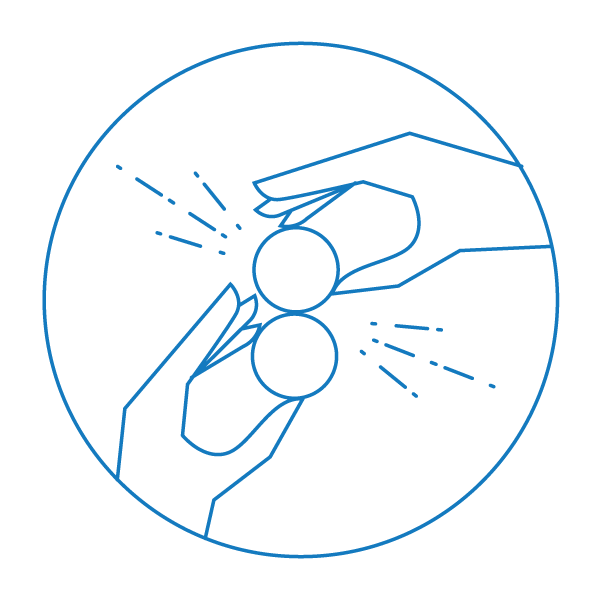
Vice President, Food & Farms
Amanda Oborne, our VP of Food & Farms, shares lessons she learned on sharing power and privilege while attending a convening of leaders working to create a more equitable and resilient food system.

The session panelists handed out a fictional scenario to facilitate small group discussions at our tables. In it, a beautiful old county seat building in a small, coastal Oregon town has become a destination for history buffs and architecture aficionados, as well as passing summer tourists. The visitors have been a boon to downtown businesses struggling to reinvent since timber revenues disappeared, and boutique hotels, restaurants, breweries and coffee shops have flourished as a result.
But the building was not designed to withstand earthquakes, and the area is projected to be at risk of a big one. Seismic assessments suggest the iconic building would crumble in an earthquake as small as 4.0, risking the lives of the nearly 800 people who work in or visit the building daily.
Seismic retrofitting would cost the county $4.5 million. Tearing the building down would cost $1 million. Building a new one compliant with current codes on a different site would cost $3 million.
Please discuss.
Chatter erupted at the tables, each of which was seated with a mix of philanthropists who are members of Sustainable Ag & Food Systems Funders (SAFSF), and their invited nonprofit guests from around the country working on the ground to create a more equitable and resilient food system. I was one of those guests, and had thus far been very impressed with the high quality of the conference content, and the degree to which these thoughtful funders were seeking to address systemic racism in our food and agriculture economies.
The session we were in was about facilitating rural dialogues. Most food system reformers and donors live in cities, and urbanites as a group seem to have all but lost the ability to understand or communicate with the rural residents who grow food, steward significant land and water resources, and like the rest of us, vote. As our country has gotten increasingly politically polarized, it has become incredibly challenging to even discuss important topics like rural economic development in the context of climate change, let alone collaborate on solutions.
The two Minnesota-based session facilitators, Kyle Bozentko from the Jefferson Center and Anna Claussen from the Institute for Agriculture and Trade Policy and a fellow at the Nathan Cummings Foundation, were trying to change all that. At this panel on rural dialogues, hosted and moderated by Tim Crosby of the Thread Fund in Seattle and an Ecotrust partner, the facilitators were sharing a framework in which they put climate change “on trial” in rural areas of the Upper Midwest. They had hosted three-day citizen juries in small towns with residents from across the political and socioeconomic divide to test assumptions and facilitate communication on one of the most contentious issues of our time. By all accounts the sessions had been incredibly successful, breaking down barriers to conversation and helping residents relate to each other in meaningful ways.
“
Most food system reformers live in cities, and urbanites seem to have all but lost the ability to understand or communicate with the rural residents who grow food and steward our land and water resources.
The small group discussions at our tables regarding the county seat building in rural Oregon were meant to give us just a taste of what the larger discussions were like, and it quickly became apparent why three days would be needed to unpack issues entangled in deeply embedded assumptions.
It seemed initially obvious from our fictional scenario that the least expensive answer was to construct a new county seat building, based on price tag alone. But how to account for the local economic development impact of the tourism associated with the vintage building? The structure had not yet been designated as a historic landmark, but it qualified as such and the application could easily be made. What of the aesthetic value, and the more deeply-held identity townspeople derived from the place? This is where things got complicated. Our table was stuck and time was up. We were deadlocked with four votes — two in favor of building a new county seat, two in favor of retrofitting the current building and seeking historic designation.
As we returned to the full group discussion, we discovered that other tables felt less conflicted. Most had voted in favor of spending more money to save the iconic structure, and cited as their rationale the gem of a building beloved by townspeople, associated with tourism and downtown revitalization, and deeply intertwined with their sense of local, place-based identity. It’s worth noting that for this particular session, most of us in the room were white, and given the nature of the conference, likely affluent and well-educated. Due to a scheduling quirk, the majority of the attendees of color were in another location preparing for the next plenary session.
The man sitting next to me, however, happened to be an enrolled member of the Leech Lake Ojibwe Nation in Northern Minnesota. His name is Martin Jennings and he is a program officer of the Northwest Area Foundation. He had moderated a stellar all-Native opening plenary at the conference that had included a rousing speech from Abigail Echo-Hawk, director of the Urban Indian Health Institute and chief research officer of the Seattle Indian Health Board. All of the conference attendees currently in the room had listened and cheered through that session. He raised his hand.
Martin had been quiet at our table during the first part of the small group discussion. Maybe he’s generally a quiet man, maybe he had something else on his mind, or maybe he’s been to a great many conferences in his career and finds it a little tedious to be so often in the professional minority and called upon to speak on behalf of his entire culture. As the conversation worked its way through the issues of cost, economic development, and identity, he listened, but seemed a bit distracted. During our small-group discussion, I had waited for him to raise the issue that seemed so obvious and painful to me after listening to Abigail Echo-Hawk during the opening, but he didn’t. So I did. That’s when our conversation got stuck and our vote deadlocked.
Now Martin was raising his hand to put that issue to the full group. After saying a few words of introduction, he turned and asked me to repeat what I’d said. I took a breath and explained: that I too felt personal connection and nostalgia for beautiful old buildings like this one, and particular kinship to this fictional town on the Oregon coast because it’s my home region, and that I even relate directly to its rural economic development impact from my work at Ecotrust. But that I have come to recognize that buildings like this one must also be seen for another of their realities, that they are artifacts of colonialism. That they are beloved primarily by people like me who have benefitted from the power they bestowed; power they stole by force from people like Martin.
“
Responsibility goes to people like me and to organizations like Ecotrust, with our relative power and privilege, to collaborate with humility.
If we as county council members were to vote to restore this beautiful building, especially at a price that would cost the county more than building a new one, what would we be saying to all those who have suffered at the hands of the power structure responsible for its construction? What would the gleaming restoration say to visitors and new arrivals in town? What would it communicate about our values, about our ongoing work inside that building, about who we see as our constituents?
The room went quiet, and then the facilitators deftly wrapped up the session and made the already obvious point about how important and difficult is the process of civil dialogue, and the necessity of inclusive participation. The small group exercise had done its job. Many of us felt something shift in the room that now can’t be un-shifted. Credit goes to SAFSF, the brilliant plenary speakers, and the talented facilitators for curating a space for such uncomfortable-yet-productive conversations. Responsibility goes to people like me and to organizations like Ecotrust, with our relative power and privilege, to collaborate with humility — to listen, learn, and share power in new ways. Our future quite literally depends on it.
Special thanks to Martin Jennings, Program Officer at Northwest Area Foundation, and the Sustainable Agriculture and Food Systems Funders (SAFSF).


website
Link Box Description. Add some text here